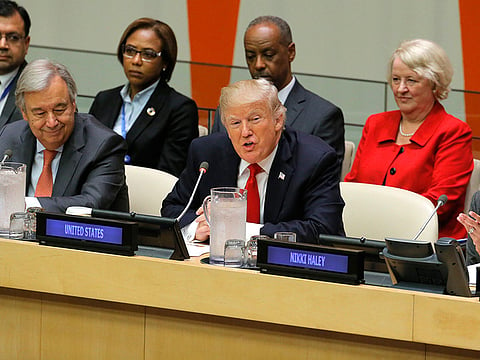The United Nations explained
Its purpose, power and problems

United Nations: Almost everybody has heard of the United Nations (UN). But how many people know what it actually does? Or how it works? Or why, as world leaders gather for the 72nd session of the UN General Assembly, the institution has struggled to live up to the promise of its founders: making the world a better, more peaceful place?
1. Birth of the United Nations: when, where and why
The United Nations Charter was signed at a conference in San Francisco in June 1945, led by four countries: Britain, China, the Soviet Union and the US.
When the charter went into effect on October 24 of that year, a global war had just ended. Much of Africa and Asia was still ruled by colonial powers.
After fierce negotiations, 50 nations agreed to a charter that begins, “We the peoples of the United Nations.”
Why is that opening line notable? Because today, the UN can, to some, seem to serve the narrow national interests of its 193 member countries — especially the most powerful ones — and not ordinary citizens.
These parochial priorities can stand in the way of fulfilling the first two pledges of the charter: to end “the scourge of war” and to regain “faith in fundamental human rights”.
2. High ideals on human rights
In 1948, the UN proclaimed the Universal Declaration of Human Rights. These include the right to not be enslaved, the right to free expression and the right to seek from other countries asylum from persecution.
However, many of the rights expressed — to education, to equal pay for equal work, to nationality — remain unrealised.
3. General Assembly: prominent stage, limited powers
Each autumn, the opening session of the UN General Assembly becomes the stage where presidents and prime ministers give speeches that can be soaring or cliched — or they can deliver long, incoherent tirades, such as the one given by Muammar Gaddafi, the Libyan strongman, in 2009.
The event offers plenty of star power, but critics contend that it is little more than a glorified gabfest.
4. Security Council: Powerful but often paralysed
The 15-member Security Council is by far the most powerful arm of the UN. It can impose sanctions, as it did against Iran over its nuclear programme, and authorise military intervention, as it did against Libya in 2011.
Critics say it is also the most anachronistic part of the organisation. Its five-permanent members are the victors of the Second World War: the US, Britain, China, France and Russia. The other 10 members are elected for two-year terms, with seats set aside for different regions of the world.
Efforts to expand the permanent membership of the council to include powers that have emerged since 1945 — such as India, Japan and Germany — have been stymied. For every country that vies for a seat, rivals seek to block it.
5. Problems keeping the peace
The Security Council’s job is to maintain international peace. Its ability to do so has been severely constrained in recent years, in large part because of bitter divisions between Russia and the West.
The council has been feckless in the face of major conflicts, particularly those in which permanent members have a stake.
Most recently, its starkest failure has been the handling of the six-year-old conflict in Syria, with Russia backing the government of President Bashar Assad and the US, Britain and France supporting some opposition groups. The Security Council has failed to take decisive action on Syria, despite reports of countless war crimes, and similarly failed to halt the conflict in Yemen, despite its contribution to an outbreak of cholera, with 600,000 cases reported so far. Most recently, the council has been confronted with mounting atrocities against the Rohingya ethnic group in Myanmar.
Also, North Korea, long an ally of China, has repeatedly ignored UN prohibitions against conducting nuclear tests, ratcheting up its arms programme with a series of nuclear and intercontinental ballistic missile tests.
Just days after the most severe sanctions to date were passed by the UN on September 11 in reaction to the North’s sixth and most powerful nuclear test, North Korea again conducted a missile test.
6. Secretary-General: Global reach, vague role
The charter is vague in defining the duties of the secretary-general, the UN’s top official. He or she is expected to show no favouritism to any particular country, but the office is largely dependent on the funding and the goodwill of the most powerful nations.
The Security Council — notably the P5 — chooses the secretary-general, by secret ballot, to serve a maximum of two five-year terms. This process makes it difficult for the role to be independent of the P5’s influence.
The secretary-general has no army to deploy, but what the position does enjoy is a bully pulpit. If the officeholder is perceived as being independent, he or she is often the only person in the world who can call warring parties to the peace table.
The current secretary-general, Antonio Guterres, a Portuguese statesman, took the reins this year. He was the UN High Commissioner for Refugees from June 2005 to December 2015.
His predecessor, Ban Ki-moon of South Korea, repeatedly revealed the limits of the office’s authority during his 10-year tenure. For example, Ban was persuaded for two years in a row to keep powerful countries off a list of those whose military forces had killed and maimed children.
Since 1946, nine people have held the position of secretary-general. All have been men.
Sign up for the Daily Briefing
Get the latest news and updates straight to your inbox



